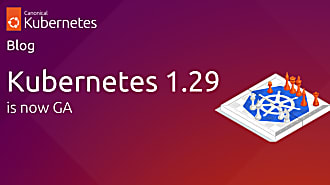Canonical
on 23 September 2021
Portainer and Canonical Expand Partnership Launching Business Charm for Charmed Kubernetes
Auckland, New Zealand – Portainer announced the launch of its Portainer Business Charmed Operator, allowing for seamless integration with Canonical’s Charmed Kubernetes distribution.
The new Portainer charm allows users of Canonical’s Charmed Kubernetes distribution to automatically install and integrate Portainer Business as part of the Kubernetes cluster deployment process, using Juju, the Charmed Operator framework.
Portainer Business is a powerful operating platform that transforms any Kubernetes implementation into a ‘containers-as-a-service’ solution. With Portainer Business at the core, Platform Managers can use Portainer’s simple GUI to configure a range of security and governance policies –such as Role Based Access and resource quotas – that control how end users (typically Developers) interact with the environment.
Developers working in a Portainer-managed environment benefit from an easy-to-use GUI to deploy, manage, and monitor their applications or, equally, can connect any dashboard or CI/CD tool they like via Portainer. Without Portainer, Developers must use complex CLI commands to deploy and monitor their apps, which is hard and a major inhibitor in the overall K8s adoption trend.
Charmed Kubernetes is Canonical’s pure upstream, composable Kubernetes distribution. It is powered by Juju and allows users to build Kubernetes clusters from the ground up and tailor them to their needs, by selecting the specific networking, storage, observability and other cloud native components they want to use. Charmed Kubernetes supports a multitude of cloud platforms from AWS, Azure and GCE, to VMware, Openstack, LXD and bare metal. With Portainer managing Charmed Kubernetes, businesses have an easy way to design and manage their Kubernetes deployments at scale.
Neil Cresswell, CEO of Portainer.io, said “Portainer Business makes managing, configuring and using the services of Charmed Kubernetes super easy for everyone involved. I’m delighted to offer the Charm to users looking for governability and security across their organisation within the integrated ecosystem of Charmed Kubernetes.”
“Canonical prioritises user choice while offering fully integrated and automated operations, which is why the Portainer Business Charm makes so much sense as part of Charmed Kubernetes. We’re huge fans of the security Portainer Business brings to companies using a wide range of CI/CD tools”, commented Alex Chalkias, Project Manager at Canonical.
The Charm is available to Charmed Kubernetes users immediately on Charmhub. Portainer and Canonical will be showcasing the charm at KubeCon North America on the 12th and 13th of October
About Canonical
Canonical is the publisher of Ubuntu, the OS for most public cloud workloads as well as the emerging categories of smart gateways, self-driving cars and advanced robots. Canonical provides enterprise security, support and services to commercial users of Ubuntu. Established in 2004, Canonical is a privately held company.
About Portainer.io
Portainer.io offers a powerful platform for companies to deliver ‘Containers-as-a-Service’ to their users. The New Zealand-based tool was born in 2017 from founders Neil Cresswell and Anthony Lapenna’s struggle to learn Docker, with the vision to create a GUI-based tool to manage Docker without frustration – regardless of whether it was deployed standalone, in a cluster, on-premise, at the edge or in the cloud.
Portainer has since expanded from GUI toolset to a toolset-agnostic platform that offers security and governability for companies and a Kube-compatible API for connecting third-party tools. In August 2020, Portainer expanded to include support for Kubernetes and Azure ACI as well as retaining full support for Docker & Docker Swarm. Portainer Community Edition currently has over 500,000 global monthly users. Portainer Business, Portainer.io’s first business product, launched in December 2020 with additional capabilities and security controls for business critical environments. The team most recently raised a US$6 million Series A round in May 2021.



